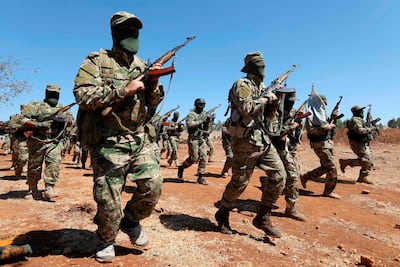March 15 marks the day when protests in Syria sparked what would become an 11-year civil war, characterised by human rights violations, terrorist acts and economic hardship.
Despite massive gains by the Assad regime territorially, north-western Syria remains a world of its own. Foreign forces attempt to exercise their own sense of control over areas they deem strategically important.
Effectively, Syria has been split four ways; areas under government control; the Autonomous Administration of North and East Syria under Kurdish rule; a region controlled by the Hayat Tahrir Al Sham (HTS) militant group; and the Syrian Interim Government backed by Turkey.
Here are the players you need to know about:
Hayat Tahrir Al Sham

Analysts differ in their categorisation of the Sunni Islamist militant group HTS — on whether it’s an offshoot of Al Qaeda or a separate entity altogether.
“The UN estimates that HTS is made up of 12,000-15,000 fighters but this number cannot be verified because of a lack of transparency by the HTS about the fighters in its ranks,” said Orwa Ajjoub, a senior analyst at the Centre for Operational Analysis and Research (Coar).
HTS was designated a Foreign Terrorist Organisation by the US State Department in 2018, along with its predecessor which was an Al Qaeda affiliate, Jabhat Al Nusra.
Today, the group's influence is more local as it attempts to break away from its links to Al Qaeda, even going as far as arresting individuals linked to the group, the Centre for Strategic and International Studies (CSIS) said in a report last year.
Despite these attempts to rebrand itself, “the US government believes that a link between the two groups remains”, the CSIS report said.
The US has called HTS a “vehicle to advance [Al Qaeda’s] position in the uprising and to further its own goals".
Regardless of how HTS is viewed by Syria watchers, its iron fist rule over the country’s north-western city of Idlib and its population of three million is not in dispute among the international community.
The Autonomous Administration of North and East Syria

The Kurdish-led Autonomous Administration and its armed wing, the Syrian Democratic Forces (SDF), are close US allies and have been instrumental in the fight against ISIS and eventual triumph in 2017.
Currently, the Autonomous Administration runs almost a third of the country in the north-east, along the southern border with Turkey.
Turkey considers the People’s Protection Units (YPG), the Syrian Kurdish armed groups which make up the bulk of the SDF, as terrorists linked to the Kurdistan Workers Party (PKK).
Turkey has categorised the SDF as a terrorist organisation and launched attacks against its forces.
A massive but deadly operation by ISIS sleeper cells in an SDF-run prison earlier this year raised alarm bells about the potential threat still posed by ISIS long after their reign ended.
The Al Hol camp in north-east Syria houses at least 64,000 ISIS-affiliated women and children, and is thought to have become a breeding ground for terrorist ideology.
“Some women there are trying to recreate another so-called caliphate. They make sure that the conditions under ISIS live on and part of that is to police other women,” Amarnath Amarasingam, an extremism researcher at Canada's Queen's University, previously told The National.
The Syrian government

Despite controlling the majority of the country, the Syrian government is faced with a number of problems as its Russian ally focuses on its invasion of Ukraine.
A long way from 2013, when the Assad regime controlled only a fifth of the country, now two thirds of Syria is under government rule — 12 million of the country’s population of 17 million.
Aside from fuel and food shortages and an economic crisis that has been worsened by the situation in neighbouring Lebanon and US sanctions, Syrian government territories have faced renewed attacks by Israel and ISIS in recent weeks.
Russia’s invasion of Ukraine has also put another nail in the coffin for Syria’s livestock sector, which relies on maize and barley imports from Russia.
Russia has been sanctioned relentlessly by the US, EU and others since it invaded Ukraine on February 24, pushing up prices for livestock fodder.
The Syrian Interim Government

This Turkish-backed alternative government has its own following, with Syrian-Turkman Abdurrahman Mustafa at the helm, but it has seen a number of changes within its ranks.
Based in Istanbul, the interim government is the executive branch of the National Coalition for the Syrian Revolution and Opposition Forces (NCSRO) and was founded in Qatar in 2012.
Despite attempts to consolidate international support, the SIG lacks the strength to challenge the Assad regime.
“Although the NCSRO received recognition from Gulf, US and some European states, it fell short to gain support from armed groups operating within the opposition areas,” Mr Ajjoub said.
It currently operates in Turkish-controlled areas in northern Aleppo and a stretch of land between Tel Abyad and Ras Ain.
“The SIG lacks the capacity and resources to implement effective administrative, legal, and regulatory structures and mechanisms, and has — in this regard — been largely unsupported by Turkey, which has aggregated this role for itself,” a 2021 report by Coar said.
Certainly, with the number of people killed since the war erupted in 2011 exceeding 350,200 and no end in sight to power grabs and political stalemate, it is unclear what can be done to salvage the situation in Syria.
“It is incumbent upon us all to listen to the voices of Syria's survivors and victims, and to the stories of those who have now fallen silent for ever”, said the UN High Commissioner for Human Rights, Michelle Bachelet, in September.

